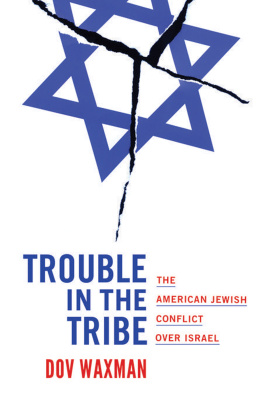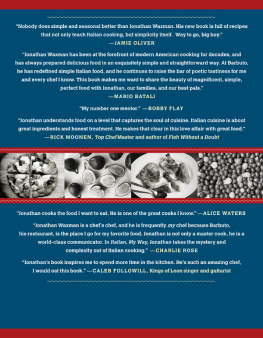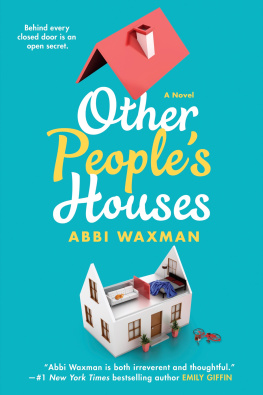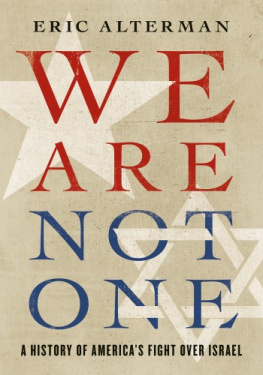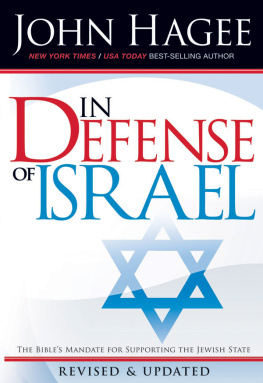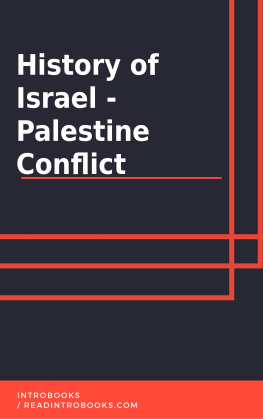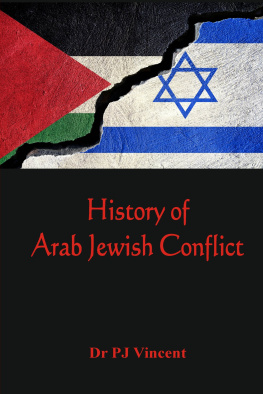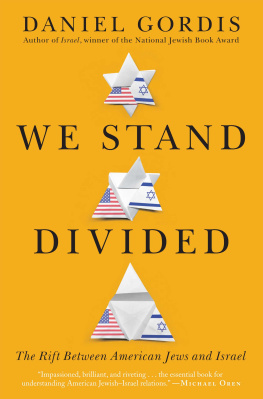Waxman - Trouble in the tribe: the American Jewish conflict over Israel
Here you can read online Waxman - Trouble in the tribe: the American Jewish conflict over Israel full text of the book (entire story) in english for free. Download pdf and epub, get meaning, cover and reviews about this ebook. City: Izrael i diaspora;Oxford;Princeton, year: 2016, publisher: Princeton University Press, genre: Politics. Description of the work, (preface) as well as reviews are available. Best literature library LitArk.com created for fans of good reading and offers a wide selection of genres:
Romance novel
Science fiction
Adventure
Detective
Science
History
Home and family
Prose
Art
Politics
Computer
Non-fiction
Religion
Business
Children
Humor
Choose a favorite category and find really read worthwhile books. Enjoy immersion in the world of imagination, feel the emotions of the characters or learn something new for yourself, make an fascinating discovery.
Trouble in the tribe: the American Jewish conflict over Israel: summary, description and annotation
We offer to read an annotation, description, summary or preface (depends on what the author of the book "Trouble in the tribe: the American Jewish conflict over Israel" wrote himself). If you haven't found the necessary information about the book — write in the comments, we will try to find it.
Trouble in the tribe: the American Jewish conflict over Israel — read online for free the complete book (whole text) full work
Below is the text of the book, divided by pages. System saving the place of the last page read, allows you to conveniently read the book "Trouble in the tribe: the American Jewish conflict over Israel" online for free, without having to search again every time where you left off. Put a bookmark, and you can go to the page where you finished reading at any time.
Font size:
Interval:
Bookmark:

TROUBLE
IN THE
TRIBE
TROUBLE IN THE TRIBE
THE
AMERICAN JEWISH
CONFLICT
OVER ISRAEL
DOV WAXMAN
PRINCETON UNIVERSITY PRESS
PRINCETON AND OXFORD
Copyright 2016 by Princeton University Press
Requests for permission to reproduce material from this work
should be sent to Permissions, Princeton University Press
Published by Princeton University Press,
41 William Street, Princeton, New Jersey 08540
In the United Kingdom: Princeton University Press,
6 Oxford Street, Woodstock, Oxfordshire OX20 1TR
press.princeton.edu
All Rights Reserved
Library of Congress Cataloging-in-Publication Data
Names: Waxman, Dov, author.
Title: Trouble in the tribe : the American Jewish conflict over Israel / Dov Waxman.
Description: Princeton, New Jersey : Princeton University Press,
[2016] | ?2016 | Includes bibliographical references and index.
Identifiers: LCCN 2015038764 | ISBN 9780691168999 (hardback)
Subjects: LCSH: Israel and the diaspora. | JewsUnited StatesAttitudes toward Israel.
Classification: LCC DS132 .W39 2016 | DDC
303.48/256940089924073dc23 LC record available at
http://lccn.loc.gov/2015038764
British Library Cataloging-in-Publication Data is available
This book has been composed in Adobe Caslon Pro
and Trade Gothic LT Std
Printed on acid-free paper.
Printed in the United States of America
1 3 5 7 9 10 8 6 4 2
CONTENTS
PREFACE AND ACKNOWLEDGMENTS
I first started thinking about writing this book in the summer of 2009 while I was doing research in Israel for a book about the Palestinian minority in Israel and Jewish-Arab relations in the country (Israels Palestinians: The Conflict Within, co-authored with Ilan Peleg). President Barack Obama had just begun his first term in office, promising a vigorous new effort at making peace between Israel and the Palestinians, and J Street, a new liberal American Jewish advocacy group, had recently been established to help him do just that. Hope and change, as the slogan went, was in the air in the United States, but thousands of miles away in Israel there seemed to be little change and no hope. Benjamin Netanyahu had become prime minister in February 2009, for the second time, and he headed an unwieldy national unity government that seemed unlikely to significantly change Israels policies toward the Palestinians, let alone end the conflict with them. The bloody and bitter stalemate between Israelis and Palestinians looked set to continue for more years to come. Many of my Israeli friends, most of them liberals, felt utterly despondent by the situation, but some were buoyed by President Obamas election and J Streets founding and hoped that somehow the United States, and American Jews in particular, would come to the rescue, and save Israel from itself. Was this possible, they asked me? Would Obama pressure the Netanyahu government to make peace? Would American Jews support him in doing so? Had they grown tired of uncritically backing Israel? I could not answer their questions, but I suspected that President Obama and American Jewry would not be the deus ex machina that my Israeli friends wished for (a suspicion that turned out to be correct). Nevertheless, I was intrigued by the possibility that American Jews, steadfast supporters of Israel for so long, might be changing their attitude toward Israel and its conflict with the Palestinians, and that this might help to finally break the Israeli-Palestinian deadlock. It was with this possibility in mind that I began my research on American Jewrys relationship with Israel.
Learning about American Jewish politics and the organized American Jewish community was also a way for me to learn more about a community in which I was both an insider and an outsider, as a British Jew who had become a naturalized American citizen. Having spent almost half my life living in the United States, Ive become an American Jew, but I retain somewhat of an outsiders perspective. I believe that this vantage point has allowed me to observe and understand the American Jewish communitys relationship with Israel in ways that Jews who are born into it seldom canin particular, it gives me the ability to stand back from the acrimonious communal conflict over Israel and not take sides in it, as many American Jewish writers on this subject tend to do. To be sure, I do not, and cannot, claim impartiality. I am not simply an outside observer of the current conflict over Israel among American Jews. I am, sometimes voluntarily and sometimes not, a participant in it. In writing this book, I have tried to be as objective as possible in my research and analysis and avoid being one-sided, but my own politics surely come through at times. I do not expect everyone who reads this book to fully agree with me, but I do hope that everyone, whatever their politics, will at least learn something important and valuable about the American Jewish community today and its changing and contentious relationship with Israel.
In many ways, the American Jewish relationship with Israelcomplicated, and often conflictedmirrors my own personal relationship with Israel. Just as the American Jewish relationship with Israel has evolved over the years, so too has my own relationship with Israel, from one of uncritical support to a more critical engagement with the country. This shift has not always been easy or comfortable for me, nor has it been for many American Jews whose attitude to Israel has undergone a similar change. In trying to better understand what is driving this change and what its consequences are, writing this book has in this respect been deeply personal for me. There is, I believe, an autobiographical element in many books, and this one is no exception.
I have been working on this book for more than four years, during which time I have attended and observed numerous conferences and meetings held by American Jewish organizations, and interviewed dozens of American Jewish communal leaders, activists, journalists, and scholars. I am grateful to the following individuals for generously giving me their time and sharing their insights and observations: Eric Alterman, Yonatan Ariel, Sharon Ashley, Steven Bayme, Peter Beinart, Jeremy Ben-Ami, Kenneth Bob, Steven M. Cohen, Lisa Colton, Stosh Cotler, David Dabscheck, Ethan Felson, Dan Fleshler, Rabbi Steve Gutow, David Harris, Malcolm Hoenlein, Rabbi Jill Jacobs, Kenneth Jacobson, Deborah Kaufman, Nancy Kaufman, Shawn Landres, Rachel Lerner, Peter Medding, Ruth Messinger, Martin Raffel, Rabbi Ed Rettig, Mark Rosenblum, John Ruskay, Nigel Savage, Yona Shem-Tov, Gideon Shimoni, Barry Shrage, Alan Snitow, Rebecca Vilkomerson, Chaim Waxman, Rabbi Melissa Weintraub, Rabbi Ari Weiss, and Rabbi Alissa Wise. I would also like to express my gratitude to Jonathan Rynhold, Brent Sasley, and Sarah-Anne Minkin for providing me with helpful feedback on parts of this manuscript, and a special thanks to Lori Lefkovitz, Kenneth Wald, and Theodore Sasson, who kindly provided detailed comments on the whole manuscript. I would also like to thank Mairav Zonszein and Ari Young for their excellent research assistance, Philip Turner for his careful editing of the manuscript, and Gili Getz for freely providing the outstanding photographs in this book. I am very grateful to my agent, Don Fehr of Trident Media Group, and to Eric Crahan, my editor at Princeton University Press, for their encouragement and guidance, and to Leslie Grundfest, my production editor at Princeton, and Jennifer Harris, my copy editor, for their meticulous work preparing the manuscript for publication. Finally, I would like to acknowledge the research institutes and universities that have hosted me and financially supported the research for this book: St. Johns College, University of Oxford; the Oxford Center for Hebrew and Jewish Studies at the University of Oxford; the Avraham Harman Institute for Contemporary Jewry at the Hebrew University, Baruch College of the City University of New York; the Professional Staff Congress of the City University of New York; and, my home institution, Northeastern University. Since moving there in 2014, its faculty, staff, and students have made me feel very much at home.
Next pageFont size:
Interval:
Bookmark:
Similar books «Trouble in the tribe: the American Jewish conflict over Israel»
Look at similar books to Trouble in the tribe: the American Jewish conflict over Israel. We have selected literature similar in name and meaning in the hope of providing readers with more options to find new, interesting, not yet read works.
Discussion, reviews of the book Trouble in the tribe: the American Jewish conflict over Israel and just readers' own opinions. Leave your comments, write what you think about the work, its meaning or the main characters. Specify what exactly you liked and what you didn't like, and why you think so.

